
PHYTOTHERAPY RESEARCH
Scope & Guideline
Innovating Pharmacology Through Phytotherapy
Introduction
Aims and Scopes
- Phytochemistry and Pharmacology:
The journal emphasizes the chemical composition and pharmacological activities of various plant extracts and compounds, exploring their mechanisms of action, efficacy, and safety in treating a range of health conditions. - Clinical Trials and Evidence-based Research:
A significant portion of the published studies includes clinical trials assessing the effectiveness and safety of herbal medicines and phytochemicals, providing valuable insights into their therapeutic potential in various diseases. - Mechanistic Studies:
Research articles often delve into the molecular and cellular mechanisms by which phytochemicals exert their effects, such as modulation of signaling pathways, antioxidant properties, and anti-inflammatory actions. - Traditional and Integrative Medicine:
The journal promotes the exploration of traditional medicine practices alongside modern scientific approaches, highlighting the role of herbal remedies in integrative health care. - Novel Therapeutic Applications:
There is a consistent focus on identifying new therapeutic uses for established phytochemicals, as well as exploring innovative formulations and delivery systems to enhance their bioavailability and efficacy.
Trending and Emerging
- COVID-19 and Herbal Remedies:
The COVID-19 pandemic has spurred a surge in research exploring the potential of herbal remedies and plant-derived compounds in preventing and treating SARS-CoV-2 infections, showcasing their relevance in contemporary health crises. - Integrative Approaches in Chronic Diseases:
Increasingly, studies are focusing on the role of phytotherapy as part of integrative treatment strategies for chronic diseases, combining herbal treatments with conventional therapies to enhance patient outcomes. - Targeting Gut Microbiota:
Research examining the interaction between phytochemicals and gut microbiota is on the rise, highlighting the importance of the microbiome in mediating the health effects of plant-derived compounds. - Nanotechnology and Phytotherapy:
There is a growing trend towards the application of nanotechnology in enhancing the delivery and effectiveness of phytochemicals, with studies exploring novel formulations and their therapeutic implications. - Personalized Phytotherapy:
Emerging research is increasingly focusing on personalized approaches to phytotherapy, considering individual variability in response to herbal treatments based on genetic, metabolic, and environmental factors.
Declining or Waning
- Basic Pharmacognosy Studies:
Research focusing solely on the identification and classification of plant species without direct therapeutic implications has seen a decrease, as the journal shifts towards more application-oriented studies. - Single Compound Studies without Clinical Context:
There is a waning interest in studies that investigate the effects of single compounds in isolation without considering their clinical relevance or potential therapeutic applications in human health. - Traditional Uses without Modern Validation:
Research centered on traditional uses of plants without rigorous scientific validation or clinical trials is becoming less common, as the journal prioritizes evidence-based studies. - Limited Scope in Non-Medicinal Plants:
The exploration of non-medicinal plants and their potential health benefits has diminished, with a stronger focus now on plants with established therapeutic applications.
Similar Journals
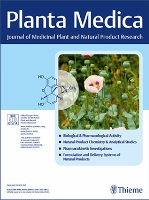
PLANTA MEDICA
Exploring the Healing Power of PlantsPLANTA MEDICA is a premier journal dedicated to advancing the field of medicinal plant research, published by Georg Thieme Verlag KG in Germany. With an ISSN of 0032-0943 and an E-ISSN of 1439-0221, this journal has been a cornerstone of scholarly communication since its inception in 1961. Recognized for its rigorous peer-review process, PLANTA MEDICA holds a notable reputation in the academic landscape, featuring a 2023 Q2 ranking in categories such as Analytical Chemistry and Pharmaceutical Science, along with respectable Q3 rankings in Drug Discovery and Molecular Medicine. The journal focuses on the synthesis, pharmacological, and biochemical assessment of phytochemicals, making it an essential resource for researchers, professionals, and students alike who are engaged in the exploration of complementary and alternative medicine. Although it does not offer open access options, its content is instrumental in identifying new therapeutic agents derived from plants, thereby underscoring its importance in drug discovery and holistic health research.
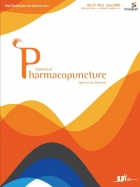
Journal of Pharmacopuncture
Transforming Healthcare with Groundbreaking DiscoveriesWelcome to the Journal of Pharmacopuncture, an esteemed publication dedicated to advancing the field of pharmacopuncture—a unique approach integrating principles of acupuncture and pharmacology. Published by the Korean Pharmacopuncture Institute in South Korea, this Open Access journal has been a vital resource for researchers and practitioners since 1997. With an impactful presence in the academic landscape, it holds a commendable Q2 ranking in Complementary and Alternative Medicine and a Q3 rank in Pharmacology as of 2023. The journal aims to disseminate groundbreaking research, innovative techniques, and critical reviews that enhance the understanding and applications of pharmacopuncture in modern medicine. As a pivotal source for both academics and industry professionals, the Journal of Pharmacopuncture is key for those eager to explore the intersection of traditional methods and contemporary scientific inquiry.
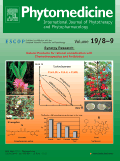
PHYTOMEDICINE
Bridging Tradition and Innovation in MedicinePHYTOMEDICINE is a premier journal published by Elsevier GmbH, based in Germany, that serves as a central hub for the dissemination of innovative research in the fields of Complementary and Alternative Medicine, Drug Discovery, Molecular Medicine, Pharmaceutical Science, and Pharmacology. Established in 1994, this multidisciplinary journal has rapidly ascended to a Q1 ranking across these categories in 2023, highlighting its significance and impact within the scientific community. With its current Scopus rankings placing it in the top tiers—such as #3 in Complementary and Alternative Medicine and #17 in Pharmaceutical Science—PHYTOMEDICINE is recognized for its commitment to publishing high-quality, peer-reviewed articles that advance our understanding of phytotherapeutics and their applications. Researchers and professionals in the field benefit from its rigorous standards and comprehensive coverage, while students gain access to essential findings that shape contemporary practices in medicine and pharmacology. Its continued focus on critical advancements ensures that PHYTOMEDICINE remains a vital resource for anyone involved in the exploration of medicinal plants and their potential health benefits.

Annals of Phytomedicine-An International Journal
Unlocking Nature's Secrets for Modern HealingAnnals of Phytomedicine - An International Journal is a leading publication dedicated to the exploration and advancement of phytomedicine, broadly encompassing research on medicinal plants, their bioactive compounds, and therapeutic applications. Published by UKAAZ Publications, this journal seeks to bridge the gap between traditional and modern medicinal practices, offering a platform for researchers, professionals, and students passionate about herbal therapies and their efficacy. With an ISSN 2393-9885 and E-ISSN 2278-9839, the journal adheres to stringent peer-review protocols to ensure the publication of high-quality research. Fostering open access to knowledge in a rapidly evolving field, Annals of Phytomedicine serves as an essential resource, promoting innovative findings and comprehensive reviews that drive the global discourse on phytotherapy. By engaging with this journal, readers can stay informed about the latest advancements, contributing significantly to the scholarly community and beyond.

Advances in Traditional Medicine
Unlocking the Secrets of Ancient RemediesAdvances in Traditional Medicine, published by SPRINGER, stands at the forefront of the Complementary and Alternative Medicine field, dedicated to exploring the intricate landscapes of traditional medical practices worldwide. With an impressive 2023 Q2 ranking and a Scopus rank of #30/105, this journal is committed to advancing scholarly discourse and innovation in the study and practice of traditional medicine, making it an essential resource for researchers, practitioners, and students alike. As an Open Access journal, it ensures wide accessibility to cutting-edge research and developments from 2020 to 2024, fostering collaboration and knowledge exchange in the global medical community. Based in Singapore, with operations linked to VAN GODEWIJCKSTRAAT 30, 3311 GZ Dordrecht, Netherlands, this journal not only enhances its reach but also enriches the academic landscape with its significant contributions to understanding the role of traditional medicine in contemporary healthcare.
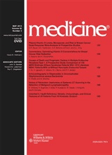
MEDICINE
Fostering innovation through open access to vital research.MEDICINE, published by Lippincott Williams & Wilkins, is an esteemed open access journal in the field of general medicine, holding a significant position with a Scopus rank of #190 out of 636 in its category (2023), placing it in the 70th percentile. Since its inception in 1922, MEDICINE has been a vital platform for researchers, professionals, and students to disseminate groundbreaking findings and advancements in the medical field. With the transition to open access in 2014, the journal ensures that valuable research is readily available to a global audience, fostering collaboration and innovation across diverse medical disciplines. Its current impact factor and influence in the miscellaneous medicine category (Q3) reflect its commitment to supporting rigorous peer-review processes and promoting scholarly excellence. Located in Philadelphia, PA, the journal covers a wide range of topics, making it a crucial resource for those dedicated to the betterment of healthcare and medical education.

Avicenna Journal of Phytomedicine
Elevating the Study of Plant-Based HealingAvicenna Journal of Phytomedicine, published by Mashhad University of Medical Sciences, is a premier Open Access journal dedicated to advancing the field of phytomedicine. Established in 2011, this journal aims to promote research on the therapeutic potentials of medicinal plants, integrating traditional knowledge with modern pharmacological insights. With an ISSN of 2228-7930 and an E-ISSN of 2228-7949, it has garnered significant attention in the research community, achieving a Q2 ranking in Complementary and Alternative Medicine and a Q3 ranking in Drug Discovery as of 2023. Its Scopus rankings affirm the journal's relevance, with the journal positioned at 37 out of 105 in its category, reflecting a 65th percentile. The Avicenna Journal of Phytomedicine serves as an invaluable resource for researchers, professionals, and students seeking to explore innovative botanical therapies, making it a notable platform for disseminating high-quality research in this burgeoning field.

MOLECULAR PHARMACOLOGY
Driving Innovation in Pharmacological ResearchMOLECULAR PHARMACOLOGY, published by the American Society for Pharmacology and Experimental Therapeutics, is an influential peer-reviewed journal dedicated to advancing the field of pharmacology through comprehensive research on molecular mechanisms of drug action. With an impressive historic convergence from 1965 to 2024, this journal plays a pivotal role in disseminating high-quality research, showcasing significant findings that impact both clinical and experimental pharmacology. Notably, it holds a distinguished Q1 ranking in Pharmacology and a Q2 ranking in Molecular Medicine as of 2023, reflecting its prominence in the academic community. Researchers and practitioners engaged in pharmacological studies will benefit from the journal’s focus on new therapeutic strategies, drug development, and the molecular basis of drug action. While MOLECULAR PHARMACOLOGY is not an open-access journal, it offers a wealth of knowledge behind a subscription model, ensuring that contributors and readers maintain a high standard of academic rigor. Address all inquiries to the editorial office located at 9650 Rockville Pike, Bethesda, MD 20814-3995, United States.

Chinese Journal of Integrative Medicine
Cultivating Knowledge in Complementary and Alternative MedicineThe Chinese Journal of Integrative Medicine, published by SPRINGER, serves as a pivotal platform for advancing the field of complementary and alternative medicine. Since its inception in 1995, this journal has been committed to disseminating high-quality research and innovative practices that integrate traditional Chinese medicine with modern medical science. With an impressive categorization in the 2023 metrics, ranking Q2 in Complementary and Alternative Medicine and Q3 in both Medicine (miscellaneous) and Pharmacology (medical), the journal highlights its recognition within the global academic landscape. Researchers and practitioners alike can benefit from its rigorous peer-reviewed articles, making significant contributions to the understanding and application of integrative health strategies. While it currently does not support open access, the journal remains a key resource for those dedicated to exploring the synergy between ancient practices and contemporary medical approaches, thus enhancing patient care and outcomes.
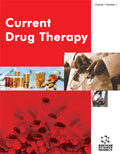
Current Drug Therapy
Fostering Dialogue on the Latest in Drug DevelopmentCurrent Drug Therapy is a pivotal journal in the field of pharmacology, published by Bentham Science Publishers Ltd. based in the United Arab Emirates. With an ISSN of 1574-8855 and an E-ISSN of 2212-3903, this journal serves as a vital platform for disseminating scholarly works that focus on the latest advancements and therapeutic applications within drug therapy. Operating without Open Access, it consistently attracts a diverse readership including researchers, healthcare professionals, and students eager to explore comprehensive reviews, original research articles, and critical insights into current trends and technologies from 2007 to 2024. Maintaining a steady presence in the competitive landscape, the journal's category quartiles reflect its growing significance, with rankings of Q4 in Pharmacology (medical) and Q3 in the broader scopes of Pharmacology, Toxicology, and Pharmaceutics as of 2023. Its contribution to the discourse in the domains of General Pharmacology, Toxicology and Pharmaceutics is underscored by its Scopus rank of #54 out of 80 in its category. Current Drug Therapy is not merely an academic resource; it is a beacon for innovation and a forum for critical dialogue that fosters the exchange of cutting-edge ideas in medication therapy, making it an essential read for professionals at the forefront of pharmaceutical Sciences.